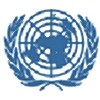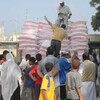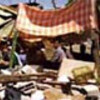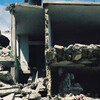
The United Nations Relief and Works Agency for Palestine Refugees today stopped distributing emergency food aid to some 600,000 refugees in the Gaza Strip, or approximately half of the refugees receiving UNRWA food aid in the occupied Palestinian territory, following restrictions introduced by Israeli authorities at the sole commercial crossing through which UNRWA is able to bring in humanitarian assistance. Stocks of rice, flour, cooking oil and other essential foodstuffs that UNRWA provides to refugees reduced to poverty, or otherwise affected by a humanitarian crisis, have been fully depleted. Read more about UNRWA suspends emergency food aid in Gaza

The Swiss Government and the United Nations Relief and Works Agency for Palestine Refugees (UNRWA) announced today that they are to host a unique conference in Geneva in June to discuss the future of humanitarian assistance to Palestine refugees. More than five decades after they first lost their homes, millions of Palestine refugees continue to live lives of hardship and poverty across the Middle East. Now, for the first time in 54 years, countries humanitarian agencies will gather together to plan humanitarian and human development strategies for the 4.1 million refugees registered with UNRWA. Read more about Switzerland and UNRWA to host major conference on humanitarian assistance to Palestine refugees

Japan has announced a donation of US$ 5.9 million to the United Nations Relief and Works Agency for Palestine Refugees. The donation includes an emergency grant of US$ 1,513,200 to support UNRWA’s emergency activities in the West Bank and Gaza Strip where the refugees have been suffering the effects of violence, curfews and closures. The emergency grant will enable UNRWA to provide equipment and supplies to its health centres in Gaza to meet the increased medical care the refugees there. Read more about Japan donates $5.9 million to Palestine refugees

Israel’s construction of a separation barrier will severely impact the lives of Palestinians in the Jerusalem area in wide-ranging activities from education to health care to relief and social services, according to a report released today by the UN Relief and Works Agency for Palestine Refugees (UNRWA). The report, the first in a series of regular updates, notes that 260 students out of a total 7,246 attending UNRWA schools, along with 86 out of 263 teachers, will be affected in their daily movements by the barrier, which will cut them off from places of learning. Read more about The impact of the Separation Barrier on refugees in Jerusalem

Three years of curfews, closures and conflict in the West Bank and Gaza have plunged two-thirds of the population into dire poverty, increased hunger and restricted access to health and education. Today UNRWA, the United Nations Relief and Works Agency for Palestine Refugees and the largest humanitarian agency in the region, launches an emergency appeal to the international community asking for $193 million to relieve some of the suffering in the occupied territories in 2004. Read more about $193m in relief needed for refugees in the West Bank and Gaza

Nineteen donor countries pledged $72 million for the 2004 budget of the United Nations Relief and Works Agency for Palestine Refugees in the Near East (UNRWA) at this morning’s meeting of the General Assembly’s Ad Hoc Committee for Voluntary Contributions. Despite an increasing beneficiary base, the 2004 budget had declined by some 5 per cent in real terms to $330 million. The 2004 budget would minimally cover the Agency’s financial needs, he continued, including $4 million in salary increases and $7 million in working capital requirements. Read more about Nineteen donor countries pledge $72 million for activities of UNRWA

Though conditions for Palestinians worsen daily, the latest appeal for emergency funds for the United Nations Relief and Works Agency for Palestine Refugees (UNRWA) has raised barely 45 per cent of the refugees’ needs, forcing programme cutbacks, the Agency’s said today. Read more about Cash-strapped UN refugee agency is forced to cut back Palestinian programmes
Although 60 per cent of the Palestinians living in the West Bank and Gaza fall below the poverty line, aid programmes have had to be cut back drastically because of the low response to appeals for donations, the chief of the main United Nations relief agency for Palestinian refugees said today. Read more about UN agency helping Palestinians says much better financial support needed

The Israeli demolition of refugee shelters in Rafah camp on the southern Gaza Strip last week has left 1,240 people homeless, United Nations relief workers said today. Read more about Israeli incursion leaves 1,240 Palestinians homeless, UN agency finds

There is a hole at the heart of Jenin camp. A hole where there once stood more than 400 refugee homes. Right now the site of the hardest-fought battle of Israel’s Operation Defensive Shield is still known as “ground zero” by locals, but within a year UNRWA hopes to transform several acres of mud into a community of modern shelters for almost 2,000 people. Read more about Rebuilding Jenin








